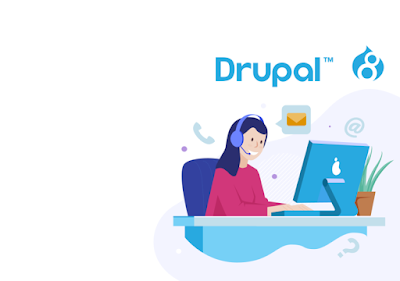Drupal is one of the most preferred CMS platforms for small and medium-sized enterprises. Ever since its evolution, it has come a long way. It is created into one of the most complex open-source CMS platforms. Drupal has been used to create websites for brands like Ubuntu, Harvard, Sony Music, MIT, and so on. Today, it supports 182 languages and is used by customers in 228 countries.
Drupal utilizes a sophisticated programming interface and has a complex learning curve. It is majorly considered more than a development platform than a simple CMS tool. It additionally has a detailed report producing tools for innovative admins. Even though no programming skills are needed for basic utilization. However, the system is used by advanced Drupal developers and engineers. This is why most of the users go with the more basic CMS tool like WordPress. Also, the Drupal CMS features are highly remarkable and adaptable to build a responsive and SEO friendly website without any issue.
Unlike other available technologies, Drupal also has its pros and cons. Let’s discussed its major pros and cons below.
Pros: Why Drupal As Your CMS?
Best Choice for Building Large and Complex Sites
Open Source & Free Code
Drupal is an open-source and completely free Content Management System (CMS). It provides similar features as compared to other CMS like WordPress or Joomla. Also, it is an open source and users can rebuild it according to their requirements.
Content Types
You can integrate numerous types of content into your site: forums, informational pages, blog posts, polls, etc.
Flexible Taxonomies
You can group the content altogether is virtually endless configurations. You also can control who can access and edit particular content sections, the appearance of the subsection, and a lot more.
PSD to Drupal
Drupal provides the adaptable feature where anyone can convert PSD to Drupal theme without any problems. The right Drupal development agency can help you to build your site with lots of features and functionalities.
Scalability
Drupal can be simply scaled to meet the needs of your sites and fluctuations in the traffic.
Multilingual Content
You will need to use plugins for multilingual content in another CMS like WordPress. But in the case of Drupal, a multilingual feature is built into the core.
Supported By Devoted Community
Support
Drupal’s big online community is greatly active, offering support via thorough documentation, user groups, chat rooms, support forums, and various other resources. Everything is accessible at no cost.
Programmer Experience
Drupal was created for web experts so that anybody can use it. Drupal’s online community incorporates a large number of experts and programmers.
Updates
Programmers and Drupal eCommerce developers constantly update Drupal with novel plugins or modules, bug fixes, and support documentation.
Security is a Big Stress
Strong Security Functions
As compared to WordPress, Drupal sites are less prone to hacks. This is one big reason why Drupal is prominent with big, security-conscious businesses and govt institutions.
Access/User Permissions
Drupal is a built-in access control system that enables you to develop roles alongside individual permissions.
Responsive
A thorough security reports are constantly posted on the official Drupal site. Also, the Drupal developers have a reputation for working fast to keep the system patched up every time.
Cons: Why Drupal May Not be the Right Choice?
Complex than Other CMSs
Sharp Learning Curve
Whether you are a pro developer or a casual user, you have to learn a lot to know basic Drupal functionalities.
Basic Code Skills Required
Drupal isn’t the right choice for freshers or newcomers. Because it requires a basic understanding of CSS, HTML, and PHP to manage the website.
Advanced Interface
As Drupal was created for web experts, less skilled users may find that the interface isn’t much intuitive for them.
Requires Effort & Time
Themes & Plugins
Drupal offers a huge number of modules and templates. However, you need to leave the system to discover the extensions before installing them. Numerous modules are not free so you will need to purchase them.
Developer Assistance Required
Some Drupal themes are custom-coded which means you will need to work with a developer to build for your site.
Updates
Legacy installations aren’t supported. It means there is no backward compatibility. You will need to upgrade and it requires time and lots of work on your part.
Performance Problems
Impact on Speed
Unless you take the time to enhance configurations, third-party extensions, if it is not properly optimized, then it will slow down Drupal both for you and your customers.
Bad Module Compatibility
The module compatibility of Drupal can enable you to effectively upgrade your website. But compatibility additionally implies that you can simultaneously run numerous modules that have their code. The wrong module combination could crash your Drupal core.
Wrapping Up
Hopefully, this post provides you more information on Drupal's pros and cons in detail. This will help you to choose the right CMS platform and how Drupal will help you if you are from a specific industry. If you are looking for a robust CMS platform that provides lots of possibilities, scalability, and flexibility, migrate your site to Drupal. Get assistance from our devoted Drupal web development team to get your site up and running. We have a team of highly qualified Drupal eCommerce developers and we can deliver high-end Drupal projects by considering your requirements.

